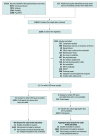Association of Task-Shared Psychological Interventions With Depression Outcomes in Low- and Middle-Income Countries: A Systematic Review and Individual Patient Data Meta-analysis
- PMID: 35319740
- PMCID: PMC8943620
- DOI: 10.1001/jamapsychiatry.2022.0301
Association of Task-Shared Psychological Interventions With Depression Outcomes in Low- and Middle-Income Countries: A Systematic Review and Individual Patient Data Meta-analysis
Erratum in
-
Error in Coding of Sex Variable in Text and Tables.JAMA Psychiatry. 2022 Dec 1;79(12):1241. doi: 10.1001/jamapsychiatry.2022.3190. JAMA Psychiatry. 2022. PMID: 36197683 Free PMC article. No abstract available.
Abstract
Importance: Task sharing, the training of nonspecialist workers with no formal experience in counseling, is a promising strategy for addressing the large gap in treatment for depression in low- and middle-income countries (LMICs).
Objective: To examine the outcomes and moderators of task-shared psychological interventions associated with depression severity, response, and remission.
Data sources: Systematic literature searches in PubMed, Embase, PsycINFO, and Cochrane Library up to January 1, 2021.
Study selection: Randomized clinical trials (RCTs) of task-shared psychological interventions compared with control conditions for adults with depressive symptoms in LMICs were included.
Data extraction and synthesis: Two researchers independently reviewed the titles, abstracts, and full text of articles from an existing generic meta-analytic database that includes all RCTs on psychotherapy for depression. A systematic review and individual patient data (IPD) meta-analysis was used to estimate the outcomes of task-shared psychological interventions across patient characteristics using mixed-effects models. Procedures for abstracting data and assessing data quality and validity followed the Preferred Reporting Items for Systematic Reviews and Meta-analyses reporting guideline.
Main outcomes and measures: Primary outcome was reduction in depression symptom severity measured by the 9-item Patient Health Questionnaire (PHQ-9). Response and remission rates were also estimated.
Results: Of 13 eligible trials, 11 (4145 participants) contributed IPD. Task-shared psychological interventions were associated with a greater decrease in depressive symptom severity than control conditions (Hedges g, 0.32; 95% CI, -0.26 to -0.38). Participants in the intervention groups had a higher chance of responding (odds ratio, 2.11; 95% CI, 1.60 to 2.80) and remitting (odds ratio, 1.87; 95% CI, 1.20 to 1.99). The presence of psychomotor symptoms was significantly associated with the outcomes of task-shared psychological interventions (β [SE], -1.21 [0.39]; P = .002). No other significant associations were identified. Heterogeneity among the trials with IPD was 74% (95% CI, 53%-86%).
Conclusions and relevance: In this meta-analysis of IPD, task-shared psychological interventions were associated with a larger reduction in depressive symptom severity and a greater chance of response and remission than control conditions. These findings show potential for the use of task-sharing of psychological interventions across different groups of patients with depression. Further research would help identify which people are most likely to benefit and strengthen larger-scale implementation of this strategy to address the burden of depression in LMICs.
Conflict of interest statement
Figures


Comment in
-
Coding Error for the Sex Variable in a Meta-analysis.JAMA Psychiatry. 2022 Dec 1;79(12):1241. doi: 10.1001/jamapsychiatry.2022.3138. JAMA Psychiatry. 2022. PMID: 36197690 No abstract available.
References
Publication types
MeSH terms
LinkOut - more resources
Full Text Sources
Medical
Miscellaneous

